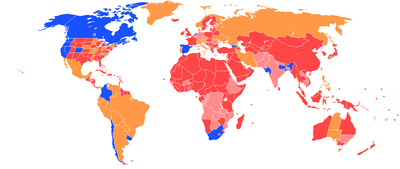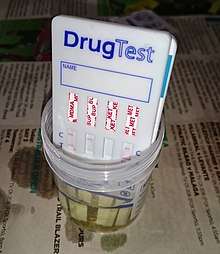Cannabis
Cannabis is a plant genus, and a variety of psychoactive products derived from these plants, including marijuana and hashish.
The legality of cannabis varies between countries. In many countries usage and possession of any amount are illegal, and enforcement might be strict. Other countries criminalize cannabis trafficking, but do not punish users. In a few countries and territories, the whole production and consumption chain of cannabis is legal for medical and/or recreational use.
Border controls on drugs are generally stringent. This includes borders within the United States of America, where neighboring states might have different drug laws — and even when they have the same laws, bringing cannabis from one state to another violates Federal drug trafficking laws.
|
This article contains general advice, followed at the reader's own risk. None of it should be taken as legal or medical advice. |
Destinations

Blue: Legal or essentially legal
Orange: Illegal but decriminalized
Pink: Illegal but often unenforced
Red: Illegal
Gray: No information
- Canada: Medical marijuana has been legal for some time, with restrictions that vary from province to province. Recreational use of marijuana has been legal since October 17, 2018; however, there are restrictions varying by province on how much can be purchased at one time, where cannabis products can legally be purchased, and which cannabis products can legally be purchased. (As of October 17, 2018, oils and smokeable cannabis are legal, while prepared edibles are not.) Importation and exportation remains illegal. See Cannabis and international travel on the Government of Canada's website for details.
- India: While cannabis remains illegal in India, some traditional forms of usage are allowed. One of them is bhang thandai, also known as bhang lassi, an infusion of cannabis paste (buds and leaves) and various nuts, herbs and spices in milk that is available in government authorised shops in parts of the subcontinent, including the states of Rajasthan, Uttar Pradesh, and Bihar.
- Netherlands: While it has never been legalized, cannabis and a handful of other substances disallowed elsewhere can be bought in "coffee shops" that are legal. The issue of "drug-tourism", however, is somewhat controversial so there may be some restrictions on foreigners frequenting coffee shops or buying cannabis products there. Cannabis products with no THC content are legal even outside coffee shops.
- Spain: While cultivation and possession for private use is legal, selling the drug is a crime.
- Uruguay: Cannabis products are legal in Uruguay. The law states that buyers have to be over 18 and legal residents of Uruguay, but this is enforced inconsistently at most; less formal vendors like farmers' market stands don't often check IDs.
- United States: Several states have legalized use and/or possession of cannabis. While federal law prohibits possession, federal authorities do not pursue intrastate users who abide by state laws. Alaska, Washington, Oregon, California, Nevada, Colorado, Massachusetts, Maine, and Washington, D.C. allow cannabis for recreational use and several more have "medical marijuana" laws of varying strictness. As the constitution explicitly grants the federal government the right to regulate interstate commerce, carrying cannabis across state lines - even between two states where it is both legal - is a federal matter and illegal. Cannabis possession is likewise illegal on some native reservations and all federal enclaves, even when surrounded by states where it is otherwise legal. Marijuana-related businesses are routinely denied access to the banking system, even in states where pot is legal (so expect to pay cash) and Customs remains a magical rights-free zone where possession of even a single copy of High Times magazine (protected by the US First Amendment as free speech anywhere else) is grounds enough for an agent to ask if you've ever used marijuana and ban you from the country for a very long time, maybe forever.
In addition to places where marijuana is legal, there are several places where it is decriminalized, de jure or de facto. This may reach from an internal police memo declaring non violent cannabis consumers the "lowest priority" to more or less formal systems where cannabis is legal in all but name. The situation may sometimes vary drastically from subnational entity to subnational entity (the de facto limit for "personal consumption" in Berlin is much higher than in Bavaria for instance and the police in Bavaria are much more eager to open cases even for personal consumption, even if such cases usually end in acquittal) and in some places even from city to city. Decriminalization might be practiced in various ways; in some cases the authorities confiscate drugs and smoking equipment, without a crime report.
The recent global trend has been one towards increasing legalization/decriminalization, but there is still a United Nations agreement that most sovereign states are parties to that classifies marijuana and hashish as controlled substances to be made illegal and combated. Many countries feel still bound by this convention, even if their actual policy is one of de facto decriminalization and laissez-faire. These jurisdictions might still criminalize imports and exports, as well as possession of quantities for more than personal use. The issue of "drug tourism" is a contentious one and most jurisdictions where consumption is legal at least in theory want to discourage people from outside the jurisdiction from visiting just for the consumption of cannabis products.
There are usually DUI laws that apply to cannabis, however legal limits for THC are much less publicized than those for ethanol and some jurisdictions have taken trace amounts of THC in the bloodstream, which - according to current medical consensus - have no impact on driving ability, as grounds for a driving ban and/or fine.
Detection of recent cannabis use

Cannabis usage can be detected through testing of urine, blood and hair samples. While blood and hair testing requires time and laboratory equipment, urine testing can be done on the spot with cheap and reliable test strips.
Detection times depend on the amount consumed, the consumption frequency, the quality of the material and the metabolism of the person. Compared to other drugs, traces of cannabis can be detected long after the last consumption. It can be difficult to tell how long after the last consumption a test will show a "positive" result, but generally the detection times for the most common test kit (20 ng/mL cut off) are:
- Up to 7 days for a one time user
- Up to 30 days for a regular weekend user
- Up to 80 days for a heavy user
These are examples and should not be used to declare someone "clean" under any circumstances. Cannabis detection times are unpredictable. If in doubt, play it safe.
In some countries, testing positive is all it takes to get you in trouble, even if you used cannabis in a country where it is legal or tolerated. Dubai has a reputation of zero tolerance, with 2 years of imprisonment for peeing positive. In Thailand, consumption without selling or trafficking is a minor offense, but testing positive might nevertheless ruin your trip.
If you choose to take the risk, stay below the radar. Dress decent and avoid that stereotypical stoner look.
Medication
- See also: Medication
As of 2018, some new prescription medications carefully extract and package just one active ingredient derived from cannabis. For instance, Epidiolex is a purified form of cannabidiol (CBD, one of hundreds of molecules found in marijuana) developed as a treatment for childhood epilepsy.
The legality of these products varies widely internationally; they may be lawfully-regulated prescription medicine in one country, criminalised as illegal street drugs in another, and pending lengthy clinical trials before they can be sold and prescribed somewhere else. Any attempt to carry this medicine into another country is a legal minefield to be avoided at all costs, even if the product is lawful and regulated at its point of origin.
Stay healthy
Some of the reported adverse health effects of cannabis are still under debate. The safest choice for many people is not to use the drug at all. Smoking any organic substance can release carcinogenic substances as well as harmful carbon monoxide (depending more on the temperature of combustion than the substance itself), so other avenues of consumption are much healthier for the lungs though not risk free either. As for smoking of other substances, there is also a fire risk.
Cannabis bought on the black market does not only raise legal concerns; it might include impurities which are much more dangerous than the cannabis itself. Furthermore there is obviously no legal recourse for bad quality, lower than advertised quantity or any other problem coming from black market dealings.
Cannabis use is also associated with a higher risk of psychosis and schizophrenia, particularly for people with a pre-existing genetic vulnerability. Although there is some scientific discussion about the exact link between cannabis and psychiatric illness, health organisations (also in countries where cannabis is legalized) typically warn against cannabis use for those with a history of psychosis. They also urge users to take extra care if there are cases of mental illness in their family or if they react unusually strongly (e.g. feel very disoriented or panic) after using cannabis.
Aside from the physical health effects, intoxication impairs sensory perception and judgment, and might be dangerous and illegal when driving. It also increases the risk of becoming a victim of a crime.
Respect
Even in countries where cannabis smoking or intoxication is not a crime, it might be prohibited, or unwelcome, at some premises. As for tobacco, think and ask before lighting up.